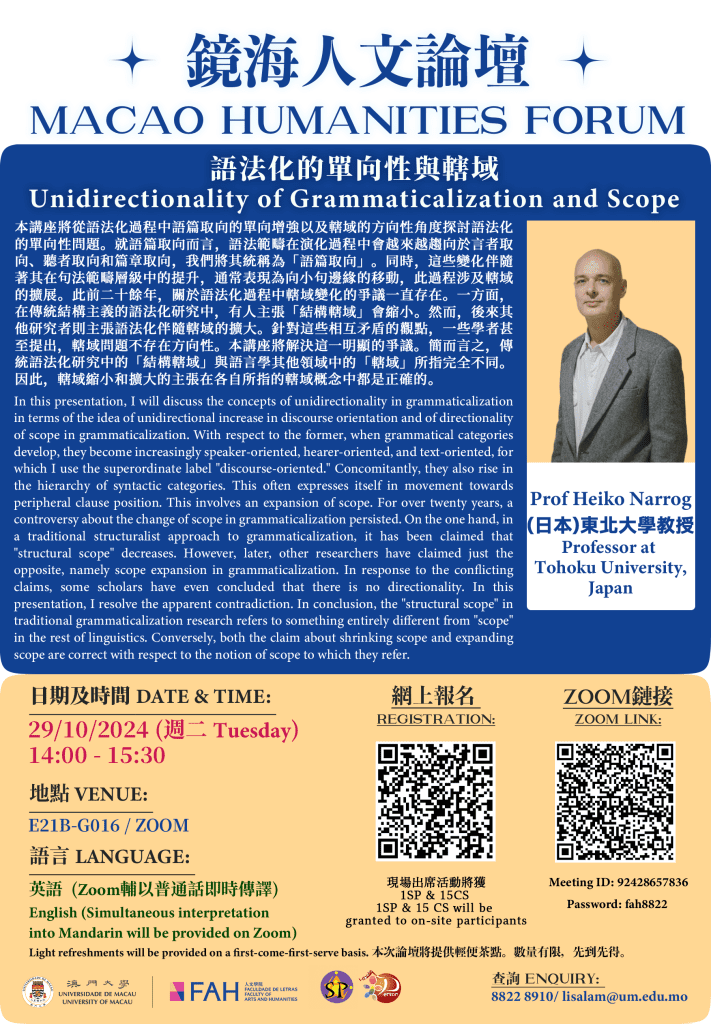【Macao Humanities Forum】Unidirectionality of Grammaticalization and Scope by Prof. Heiko Narrog from Tohoku University (1 Smart Point and 15 CS)
【鏡海人文論壇】語法化的單向性與轄域 - 日本東北大學 Heiko Narrog教授 (1粒至叻星及15個CS)
現場出席活動的同學可獲一粒至叻星及全人發展獎勵計劃“知識整合能力”項的15個CS
On-site Participating Students will be awarded 1 SAO Smart Point and 15 CS on“Knowledge integration” in the Whole Person Development Award Programme
鏡海人文論壇(2024/2025)第二講將於2024年10月29日舉行。人文學院定期邀請來自不同人文領域的世界知名學者,與師生分享其研究成果。 我們誠摯邀請澳大同仁參加本次精彩的論壇。
人文學院邀請Heiko Narrog教授擔任本次鏡海人文論壇的演講嘉賓,講題為「語法化的單向性與轄域」。Narrog教授現任日本東北大學教授,曾分別於波鴻魯爾大學和東京大學獲得博士學位。Narrog教授的研究方向包括語言類型學、情態、語法演變(尤其是語法化)以及語義地圖。其著作涵蓋多部由牛津大學出版社出版的專著和合編手冊,包括《日語情態與小句層級結構》(約翰・本傑明出版公司,2009)、《情態、主觀性與語義演變:跨語言視角》(牛津大學出版社,2012)、《語法化》(牛津大學出版社,2021,與Bernd Heine教授合著),以及與Bernd Heine教授合編、由牛津大學出版社出版的《牛津語言分析手冊》(2009/2015)、《牛津語法化手冊》(2011/2021)和《類型學視角下的語法化》(2018)。
論壇詳情如下:
講者:Heiko Narrog教授
主題:語法化的單向性與轄域
日期:2024年10月29日(星期二)
時間:14:00 – 15:30*
地點: E21B-G016/ 線上ZOOM
語言:英語(ZOOM輔以普通話即時傳譯)
*本次論壇將提供輕便茶點,數量有限,先到先得。
摘要:本講座將從語法化過程中語篇取向的單向增強以及轄域的方向性角度探討語法化的單向性問題。就語篇取向而言,語法範疇在演化過程中會越來越趨向於言者取向、聽者取向和篇章取向,我們將其統稱為「語篇取向」。同時,這些變化伴隨著其在句法範疇層級中的提升,通常表現為向小句邊緣的移動,此過程涉及轄域的擴展。此前二十餘年,關於語法化過程中轄域變化的爭議一直存在。一方面,在傳統結構主義的語法化研究中,有人主張「結構轄域」會縮小。然而,後來其他研究者則主張語法化伴隨轄域的擴大。針對這些相互矛盾的觀點,一些學者甚至提出,轄域問題不存在方向性。本講座將解決這一明顯的爭議。簡而言之,傳統語法化研究中的「結構轄域」與語言學其他領域中的「轄域」所指完全不同。因此,轄域縮小和擴大的主張在各自所指的轄域概念中都是正確的。
歡迎有興趣參與的同事及同學於2024年10月27日(星期日)或之前透過https://umac.au1.qualtrics.com/jfe/form/SV_3KjCmsA0bbEnccC 報名。
The Faculty of Arts and Humanities (FAH) is delighted to announce that the 2nd Lecture of the Macao Humanities Forum (2024/2025) will be held on 29 October 2024. The forum aims to provide a platform for world-renowned scholars from diverse humanities fields to share their research with the FAH community and other UM scholars. All members of the UM community are cordially invited to this splendid event.
In this upcoming forum, we are honored to have Prof. Heiko Narrog as our guest speaker to deliver a lecture on the topic “Unidirectionality of Grammaticalization and Scope”. Prof. Narrog is a professor at Tohoku University, Japan. He received two PhDs from Ruhr University Bochum and the University of Tokyo respectively. His publications include the monographs Modality in Japanese and the Layered Structure of Clause (Benjamins, 2009), Modality, Subjectivity, and Semantic Change: A Cross-Linguistic Perspective (Oxford University Press, 2012), and Grammaticalization (Oxford University Press, 2021, co-authored with Bernd Heine), as well as three co-edited volumes with Bernd Heine The Oxford Handbook of Linguistic Analysis (Oxford University Press, 2009/2015), The Oxford Handbook of Grammaticalization (Oxford University Press, 2011/2021), and Grammaticalization from a Typological Perspective (Oxford University Press, 2018).
Details of the forum are as follows:
Speaker: Prof. Heiko Narrog
Topic: Unidirectionality of Grammaticalization and Scope
Date: 29 Oct 2024 (Tue)
Time: 14:00 – 15:30*
Venue: On-Site (E21B-G016) / ZOOM
Language: English (Simultaneous interpretation into Mandarin will be provided on Zoom)
*Light refreshments will be provided on a first-come-first-served basis
Abstract:
In this presentation, I will discuss the concepts of unidirectionality in grammaticalization in terms of the idea of unidirectional increase in discourse orientation and of directionality of scope in grammaticalization. With respect to the former, when grammatical categories develop, they become increasingly speaker-oriented, hearer-oriented, and text-oriented, for which I use the superordinate label “discourse-oriented.” Concomitantly, they also rise in the hierarchy of syntactic categories. This often expresses itself in movement towards peripheral clause position. This involves an expansion of scope. For over twenty years, a controversy about the change of scope in grammaticalization persisted. On the one hand, in a traditional structuralist approach to grammaticalization, it has been claimed that “structural scope” decreases. However, later, other researchers have claimed just the opposite, namely scope expansion in grammaticalization. In response to the conflicting claims, some scholars have even concluded that there is no directionality. In this presentation, I resolve the apparent contradiction. In conclusion, the “structural scope” in traditional grammaticalization research refers to something entirely different from “scope” in the rest of linguistics. Conversely, both the claim about shrinking scope and expanding scope are correct with respect to the notion of scope to which they refer.
Please register for the forum by 27 Oct 2024 (Sun) via https://umac.au1.qualtrics.com/jfe/form/SV_3KjCmsA0bbEnccC


